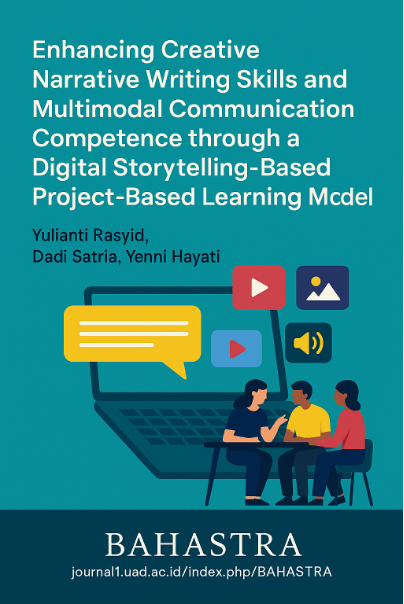Enhancing creative narrative writing skills and multimodal communication competence through a digital storytelling-based project-based learning model
DOI:
https://doi.org/10.26555/bs.v45i2.1580Keywords:
Project-Based Learning, Digital Storytelling Multimodal, CommunicationAbstract
A fundamental gap between the demand for multimodal communication competence in the digital era and conventional, text-centric writing pedagogy in higher education was the foundational problem for this research. This study investigated the effectiveness of an integrated learning model, combining Project-Based Learning (PjBL) and Digital Storytelling (DST), as a solution to simultaneously enhance students' creative narrative writing skills and multimodal communication competence. The research employed a quasi-experimental pretest-posttest nonequivalent control group design involving 60 Indonesian Language and Literature Education students, divided into an experimental group (n=30) and a control group (n=30). The results demonstrated a statistically significant advantage for the experimental group, which exhibited substantially greater improvement in creative narrative writing skills (t(58) = 20.45, p < .001) and achieved superior multimodal communication competence scores (t(58) = 16.98, p < .001) compared to the control group. The study concluded that the integration of PjBL and DST is an effective and robust pedagogical intervention for equipping students with holistic literacy skills relevant to the 21st century, successfully bridging traditional writing practices with contemporary digital communication demands.
References
Al-Kamzari, F., & Alias, N. (2025). A systematic literature review of project-based learning in secondary school physics: Theoretical foundations, design principles, and implementation strategies. Humanities and Social Sciences Communications, 12(1), 1-18. https://doi.org/10.1057/s41599-025-04579-4
Christwardana, M., Handayani, S., Enjarlis, E., Ismojo, I., Ratnawati, R., Joelianingsih, J., & Yoshi, L. A. (2022). Community service as an application of the independent learning – independent campus program to improve the competence of chemical engineering students through collaborative and student project-based learning. Education for Chemical Engineers, 40, 1–7. https://doi.org/10.1016/j.ece.2022.03.002
Gürsoy, G. (2021). Digital storytelling: Developing 21st century skills in science education. European Journal of Educational Research, 10(1), 97–113. https://doi.org/10.12973/eu-jer.10.1.97
Hastuti, S., Slamet, Sumarwati, & Rakhmawati, A. (2023). Short story writing learning based on local wisdom with digital book media for university students. International Journal of Instruction, 16(1), 821–832. https://doi.org/10.29333/iji.2023.16146a
Indriati, L., Mai, N., & Tan, H. Y.-J. (2024). Enhancing authentic assessment in large-class design education through authentic project-based learning. International Journal of Learning, Teaching, and Educational Research, 23(9), 432–452. https://doi.org/10.26803/ijlter.23.9.22
Irawan, D. (2025). Strategi komunikasi dakwah (Studi analisis dakwah tradisonal dengan inovasi digital). Syi’ar: Jurnal Ilmu Komunikasi, Penyuluhan dan Bimbingan Masyarakat Islam, 8(1), 1–16. https://doi.org/10.37567/syiar.v8i1.3784
Keleman, M. (2021). Assessment of higher order thinking skills through stem integration project-based learning for elementary level. International Journal of Social Science and Human Research, 4(4), 835-846. https://doi.org/10.47191/ijsshr/v4-i4-40
Kemendikbudristek. (2023). Buku panduan kampus mengajar angkatan 5 (1st ed.). Direktorat Jenderal Pendidikan Vokasi Direktorat Jenderal Guru dan Tenaga Kependidikan Direktorat Jenderal Pendidikan Anak Usia Dini, dan, Dasar.
Khoudri, I., Khoudri, A., & Zeriouh, M. (2023). Enhancing EFL learner autonomy through project-based learning: The case of secondary school students. Journal of English Language Teaching and Linguistics, 8(3), 341-352. https://doi.org/10.21462/jeltl.v8i3.1199
Kress, G., & Leeuwen, T. Van. (2006). Reading images: The grammar of visual design (2nd ed.). Routledge. https://doi.org/10.4324/9780203619728
Lacković, N., & Olteanu, A. (2023). Relational and multimodal higher education (1st ed.). Routledge. https://doi.org/10.4324/9781003155201
Lim, F. V. (2024). The multimodal turn in higher education (1st ed.). Routledge. https://doi.org/10.4324/9781003205517-2
Maryati, S., Lestari, D. G., & Riyanto, Y. (2022). The effectiveness of mentoring in the implementation of the project-based learning (PjBL) model in the independent curriculum for PAUD educators. European Journal of Education and Pedagogy, 3(6), 12–18. https://doi.org/10.24018/ejedu.2022.3.6.471
Morais, P., Ferreira, M. J., & Veloso, B. (2021). Improving student engagement with project-based learning: A case study in software engineering. IEEE Revista Iberoamericana de Tecnologias Del Aprendizaje, 16(1), 21–28. https://doi.org/10.1109/RITA.2021.3052677
Özen, E. N., & Duran, E. (2021). Contribution of digital storytelling to creative thinking skills. Turkish Journal of Education, 10(4), 297–318. https://doi.org/10.19128/turje.909865
Retno, R. S., Purnomo, P., Hidayat, A., & Mashfufah, A. (2025). Conceptual framework design for STEM-Integrated project-based learning (PjBL-STEM) for elementary schools. Asian Education and Development Studies, 14(3), 579–604. https://doi.org/10.1108/AEDS-08-2024-0188
Sukackė, V., Guerra, A. O. P. de C., Ellinger, D., Carlos, V., Petronienė, S., Gaižiūnienė, L., Blanch, S., Marbà-Tallada, A., & Brose, A. (2022). Towards active evidence-based learning in engineering education: A systematic literature review of PBL, PjBL, and CBL. Sustainability, 14(21), 1-31. https://doi.org/10.3390/su142113955
Susanto, C., Hastuti, R., & Tiofanny, J. (2024). Kaitan motivasi akademik dan school well-being siswa SMA yang menggunakan kurikulum merdeka belajar. Edukatif: Jurnal Ilmu Pendidikan, 6(3), 2498–2506. https://doi.org/10.31004/edukatif.v6i3.6867
Susanto, T. T. D., Soraya, E., Febriana, A., & Muhidin, A. (2025). Transformasi pendidikan untuk memerangi korupsi: Integrasi filsafat pendidikan dan pedagogi masa depan (1st ed.). Deepublish.
Tanrıkulu, F. (2022). Students’ perceptions about the effects of collaborative digital storytelling on writing skills. Computer Assisted Language Learning, 35(5–6), 1090–1105. https://doi.org/10.1080/09588221.2020.1774611
Urbieta, A. S., & Peñalver, E. A. (2025). Assessing multimodal discourse in digital storytelling for ESP: Multimodal literacy in english as an additional language in higher education (1st ed.). Routledge. https://doi.org/10.4324/9781003429876-9
Vidergor, H. E. (2022). Effects of innovative project-based learning model on students’ knowledge acquisition, cognitive abilities, and personal competences. Interdisciplinary Journal of Problem-Based Learning, 16(1), 1-17. https://doi.org/10.14434/ijpbl.v16i1.31183
Wang, H. (2025). Multimodal digital storytelling as literacy learning and moral cultivation practices for. Arab World English Journal, 16(1), 366–383. https://doi.org/10.24093/awej/vol16no1.23
Widyaningrum, R., & Prihastari, E. B. (2023). Implementing local wisdom-integrated project-based learning model to instill students’ learning independence. SHS Web of Conferences, 173, 01011. https://doi.org/10.1051/shsconf/202317301011
Wu, X. Y. (2024). Unveiling the dynamics of self-regulated learning in project-based learning environments. Heliyon, 10(5), 1-19. https://doi.org/10.1016/j.heliyon.2024.e27335
Yang, Y.-T. C., Chen, Y.-C., & Hung, H.-T. (2022). Digital storytelling as an interdisciplinary project to improve students’ english speaking and creative thinking. Computer Assisted Language Learning, 35(4), 840–862. https://doi.org/10.1080/09588221.2020.1750431
Zarifsanaiey, N., Mehrabi, Z., Kashefian-Naeeini, S., & Mustapha, R. (2022). The effects of digital storytelling with group discussion on social and emotional intelligence among female elementary school students. Cogent Psychology, 9(1), 1-16. https://doi.org/10.1080/23311908.2021.2004872

Downloads
Published
Issue
Section
License
Copyright (c) 2025 Yulianti Rasyid, Dadi Satria, Yenni Hayati

This work is licensed under a Creative Commons Attribution-ShareAlike 4.0 International License.

1.jpg)






